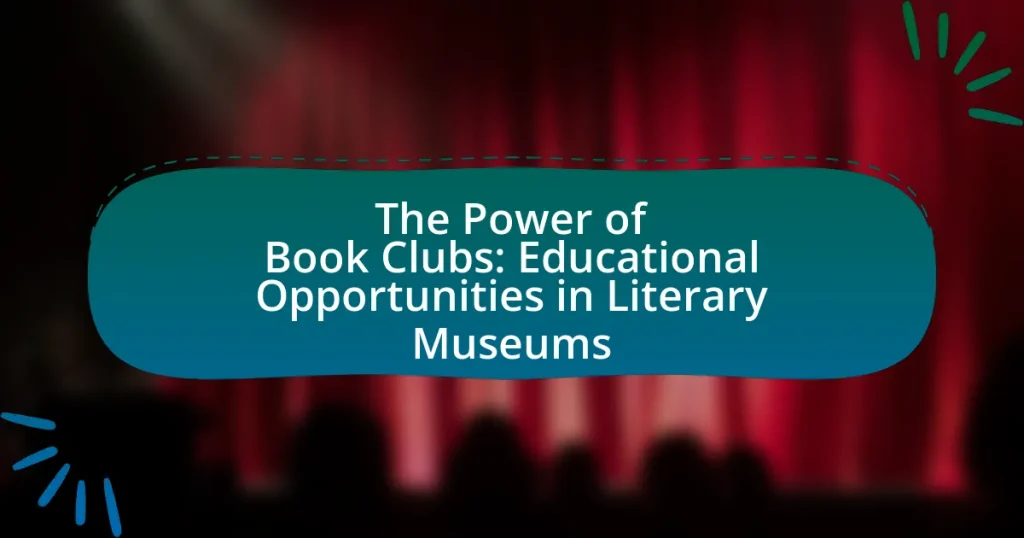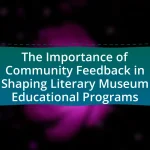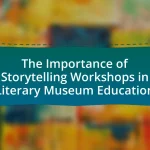Book clubs in literary museums serve as vital educational platforms that enhance literary analysis, foster community engagement, and promote critical thinking. These clubs provide participants with access to curated collections and artifacts that deepen their understanding of literary themes and historical contexts. Through collaborative discussions, members develop essential skills such as critical thinking, communication, and analytical abilities, while also exploring diverse genres and themes. The immersive environment of literary museums enriches the book club experience, making it an effective setting for promoting cultural literacy and appreciation for literature.
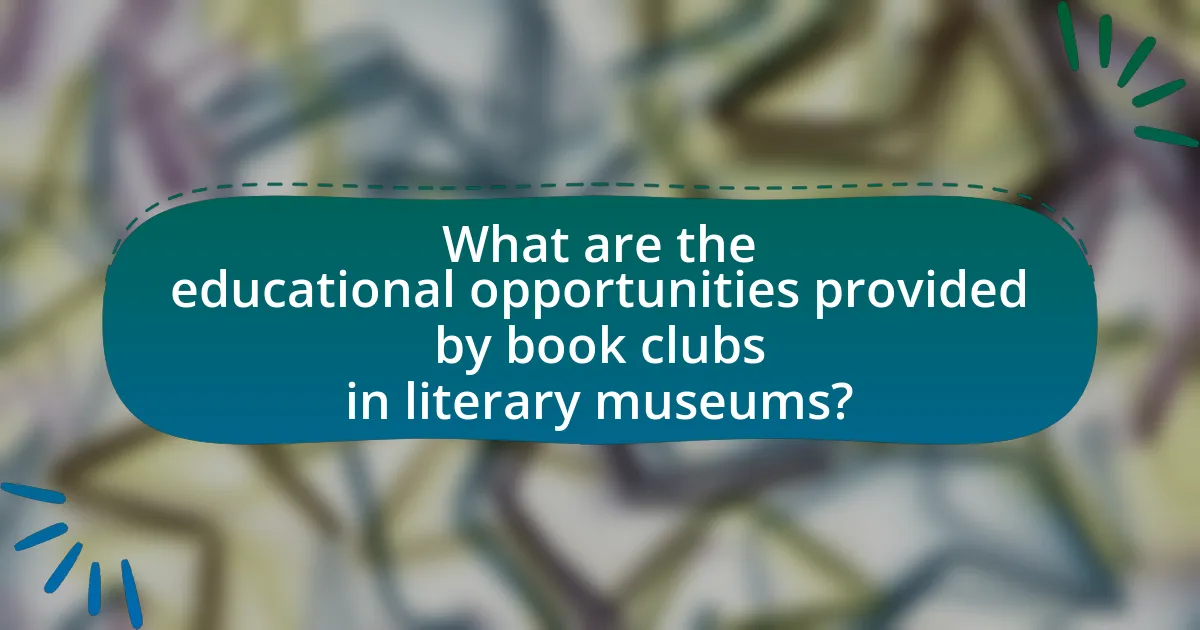
What are the educational opportunities provided by book clubs in literary museums?
Book clubs in literary museums provide educational opportunities such as enhanced literary analysis, exposure to diverse genres, and community engagement through discussions. These clubs facilitate critical thinking by encouraging participants to analyze texts deeply, fostering a greater understanding of literary themes and historical contexts. Additionally, literary museums often curate specific collections that align with the book club’s reading selections, allowing members to engage with artifacts and exhibits that enrich their reading experience. This combination of literary exploration and museum resources creates a dynamic learning environment that promotes cultural literacy and appreciation for literature.
How do book clubs enhance the learning experience in literary museums?
Book clubs enhance the learning experience in literary museums by fostering collaborative discussions that deepen understanding of literary works. These discussions allow participants to share diverse perspectives, which enriches the interpretation of texts and their historical contexts. Research indicates that group engagement in literary analysis can lead to improved critical thinking skills and greater retention of information, as seen in studies conducted by the National Endowment for the Arts, which highlight the benefits of communal reading experiences. Additionally, book clubs often incorporate museum resources, such as author exhibits and historical artifacts, providing a tangible connection to the literature being discussed, thereby enhancing the overall educational impact.
What specific skills do participants develop through book clubs?
Participants in book clubs develop critical thinking, communication, and analytical skills. Critical thinking is enhanced as members evaluate themes, characters, and plot developments, fostering deeper understanding and interpretation of texts. Communication skills improve through discussions, where participants articulate their thoughts and listen to diverse perspectives. Additionally, analytical skills are sharpened as members dissect narratives and explore underlying messages, which promotes a more nuanced appreciation of literature. These skills are supported by research indicating that group discussions enhance cognitive engagement and comprehension, as noted in studies on collaborative learning environments.
How do discussions in book clubs promote critical thinking?
Discussions in book clubs promote critical thinking by encouraging participants to analyze and evaluate different perspectives on the text. Engaging in dialogue about themes, characters, and plot developments requires members to articulate their thoughts, question assumptions, and consider alternative viewpoints. Research indicates that collaborative discussions enhance cognitive skills; for instance, a study published in the Journal of Educational Psychology found that peer discussions significantly improve critical thinking abilities by fostering deeper comprehension and reflection on the material. Thus, the interactive nature of book club discussions serves as a catalyst for developing critical thinking skills.
Why are literary museums ideal settings for book clubs?
Literary museums are ideal settings for book clubs because they provide an immersive environment that enhances literary discussions. The presence of artifacts, manuscripts, and exhibits related to authors and their works fosters a deeper understanding of the literature being discussed. For instance, visiting the Ernest Hemingway Home and Museum allows book club members to engage with the author’s life and context, enriching their interpretation of his texts. Additionally, literary museums often host events, workshops, and lectures that can complement book club activities, further promoting educational opportunities and community engagement.
What unique resources do literary museums offer to book club members?
Literary museums offer book club members unique resources such as curated collections of manuscripts, letters, and artifacts related to authors and literary movements. These resources provide in-depth insights into the historical context and creative processes of writers, enhancing the reading experience. For example, the British Library houses original manuscripts from famous authors, allowing book club members to engage with the texts on a deeper level. Additionally, many literary museums host author talks, workshops, and guided tours that facilitate discussions and foster a greater appreciation for literature among members.
How does the atmosphere of a literary museum contribute to book club discussions?
The atmosphere of a literary museum enhances book club discussions by providing a rich, immersive environment that fosters deeper engagement with literary works. This setting encourages participants to connect more profoundly with the themes, characters, and historical contexts of the books being discussed. For instance, the presence of original manuscripts, artifacts, and curated exhibits related to authors can spark insightful conversations and inspire members to explore the nuances of the text in relation to the author’s life and times. Additionally, the quiet, reflective ambiance of a museum allows for focused dialogue, promoting thoughtful exchanges and a shared appreciation for literature among club members.
What types of book clubs can be found in literary museums?
Literary museums typically host several types of book clubs, including genre-specific clubs, author-focused clubs, and thematic discussion groups. Genre-specific clubs concentrate on particular literary genres such as fiction, poetry, or non-fiction, allowing participants to explore and discuss works within that category. Author-focused clubs center around the works of a specific author, providing an in-depth examination of their literature and influence. Thematic discussion groups tackle broader themes or topics, encouraging participants to connect various texts and ideas across different authors and genres. These formats enhance the educational experience by fostering critical thinking and community engagement among participants.
What themes or genres are commonly explored in these book clubs?
Book clubs commonly explore themes such as identity, social justice, and personal growth, along with genres including fiction, non-fiction, and historical literature. These themes and genres facilitate discussions that enhance understanding of diverse perspectives and foster community engagement. Research indicates that book clubs focusing on social justice themes, for example, can lead to increased awareness and activism among participants, as evidenced by studies showing that literature can influence social attitudes and behaviors.
How do different formats of book clubs cater to diverse audiences?
Different formats of book clubs cater to diverse audiences by offering various structures that meet the unique preferences and needs of participants. For instance, traditional in-person book clubs foster community and social interaction, appealing to those who value face-to-face discussions. Virtual book clubs, on the other hand, provide flexibility and accessibility, attracting individuals who may have scheduling conflicts or live in remote areas. Additionally, genre-specific clubs, such as those focused on science fiction or historical fiction, engage niche audiences by aligning with their specific interests. Research indicates that 70% of participants in genre-focused clubs report higher satisfaction due to shared interests, demonstrating how tailored formats enhance engagement and inclusivity.
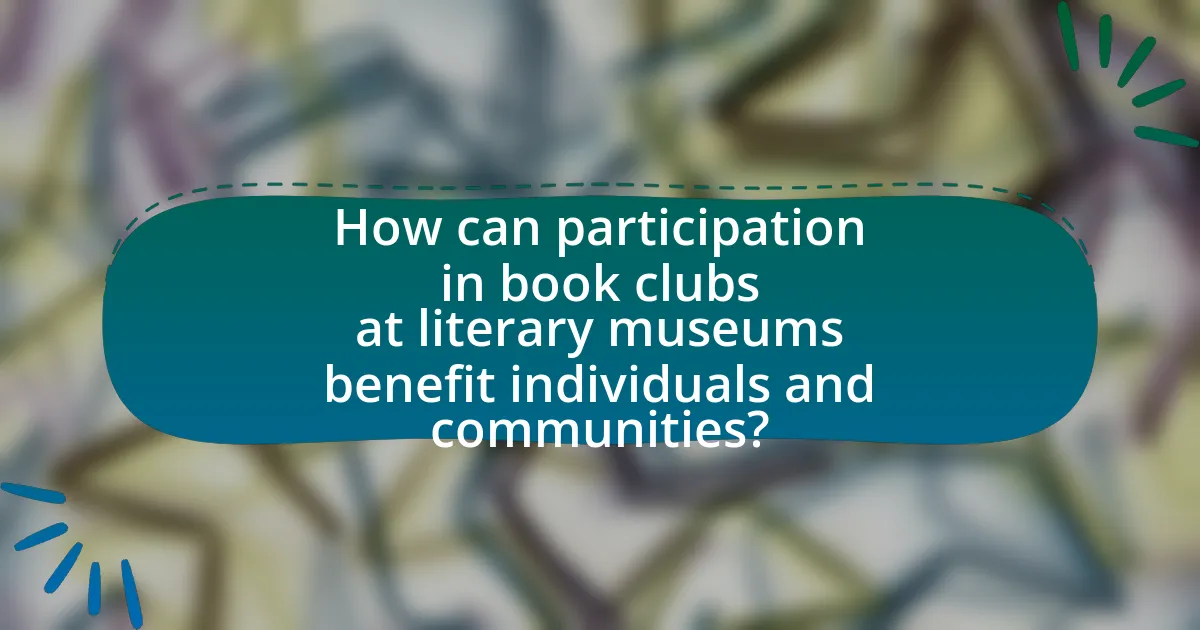
How can participation in book clubs at literary museums benefit individuals and communities?
Participation in book clubs at literary museums benefits individuals and communities by fostering a love for literature and enhancing social connections. Individuals gain critical thinking skills and diverse perspectives through discussions, while communities experience increased engagement and cultural enrichment. Research indicates that book clubs can improve literacy rates and promote lifelong learning, as seen in studies conducted by the National Endowment for the Arts, which found that reading groups contribute to higher levels of reading enjoyment and community involvement.
What personal benefits do individuals gain from joining book clubs in literary museums?
Individuals gain enhanced social interaction, improved critical thinking skills, and increased literary appreciation from joining book clubs in literary museums. These clubs foster a community where members engage in discussions about literature, which promotes social connections and reduces feelings of isolation. Research indicates that participating in group discussions enhances critical thinking by encouraging members to analyze and articulate their thoughts on various texts. Additionally, literary museums often provide access to unique resources and expert insights, enriching members’ understanding and appreciation of literature. This combination of social engagement, cognitive development, and exposure to literary culture underscores the personal benefits of joining such book clubs.
How does social interaction in book clubs enhance personal growth?
Social interaction in book clubs enhances personal growth by fostering critical thinking, empathy, and communication skills. Engaging in discussions about diverse perspectives and themes in literature encourages members to articulate their thoughts and consider viewpoints different from their own. Research indicates that participation in group discussions can improve cognitive abilities and emotional intelligence, as individuals learn to navigate complex ideas and relate to others’ experiences. For instance, a study published in the Journal of Educational Psychology found that collaborative learning environments, such as those in book clubs, significantly boost participants’ analytical skills and self-awareness, contributing to overall personal development.
What role does reading play in fostering empathy and understanding?
Reading plays a crucial role in fostering empathy and understanding by allowing individuals to experience diverse perspectives and emotions through characters and narratives. Engaging with literature exposes readers to different cultures, life experiences, and social issues, which enhances their ability to relate to others. Research by Mar, Oatley, and Peterson in “Exploring the link between reading fiction and empathy” (2010) demonstrates that individuals who read fiction show greater empathy and social understanding compared to those who do not. This connection is attributed to the immersive nature of storytelling, which encourages readers to step into the shoes of others, thereby broadening their emotional and cognitive horizons.
How do book clubs contribute to community engagement and cultural enrichment?
Book clubs contribute to community engagement and cultural enrichment by fostering social connections and promoting diverse literary discussions. These groups create a platform for individuals to share perspectives, enhancing understanding of different cultures and ideas. Research indicates that participation in book clubs can lead to increased civic involvement, as members often engage in community activities inspired by their readings. For example, a study by the National Endowment for the Arts found that reading groups enhance social cohesion and cultural awareness, demonstrating the significant role book clubs play in enriching community life.
What impact do book clubs have on local literacy rates?
Book clubs positively impact local literacy rates by fostering a community of reading and discussion. They encourage participants to read more frequently, which enhances comprehension and vocabulary skills. Research indicates that individuals who engage in book clubs demonstrate improved literacy levels, as they are motivated to read diverse genres and share insights with others. A study by the National Endowment for the Arts found that adults who participate in book clubs are more likely to engage in reading activities, leading to higher literacy rates in their communities.
How can book clubs serve as a platform for community dialogue?
Book clubs can serve as a platform for community dialogue by fostering open discussions around diverse literary works that reflect various cultural, social, and political perspectives. These discussions encourage participants to share their viewpoints, experiences, and interpretations, thereby promoting understanding and empathy among community members. Research indicates that engaging in dialogue about literature can enhance critical thinking and communication skills, as seen in studies conducted by the National Endowment for the Arts, which highlight the role of reading in community engagement. By creating a safe space for dialogue, book clubs facilitate connections among individuals, ultimately strengthening community bonds and encouraging civic participation.
What challenges do book clubs face in literary museums?
Book clubs face several challenges in literary museums, primarily related to accessibility, engagement, and resource availability. Accessibility issues arise when museums are not equipped to accommodate diverse groups, including those with disabilities or varying literacy levels. Engagement can be difficult as book clubs may struggle to connect their discussions with the museum’s exhibits or themes, leading to a lack of relevance for participants. Additionally, resource availability is a concern; many literary museums may not provide sufficient materials or support for book clubs, such as curated reading lists or discussion guides, which can hinder the overall experience. These challenges can limit the effectiveness of book clubs in fostering educational opportunities within literary museums.
How can book clubs overcome barriers to participation?
Book clubs can overcome barriers to participation by implementing flexible meeting schedules and utilizing digital platforms for discussions. Flexibility allows members with varying commitments to join, while digital platforms, such as Zoom or social media groups, enable participation regardless of geographical location. Research indicates that online book clubs have seen a 50% increase in membership due to their accessibility, demonstrating that adapting to members’ needs can significantly enhance engagement.
What strategies can be implemented to sustain interest in book clubs?
To sustain interest in book clubs, implementing diverse reading selections and interactive discussions is essential. By curating a mix of genres, themes, and authors, clubs can cater to varied interests, keeping members engaged. Additionally, incorporating activities such as author Q&A sessions, themed meetings, or collaborative projects can enhance participation. Research indicates that clubs with varied formats and engaging content see higher retention rates, as members feel more invested in the experience. For instance, a study by the American Library Association found that book clubs that included interactive elements reported a 30% increase in member satisfaction and attendance.
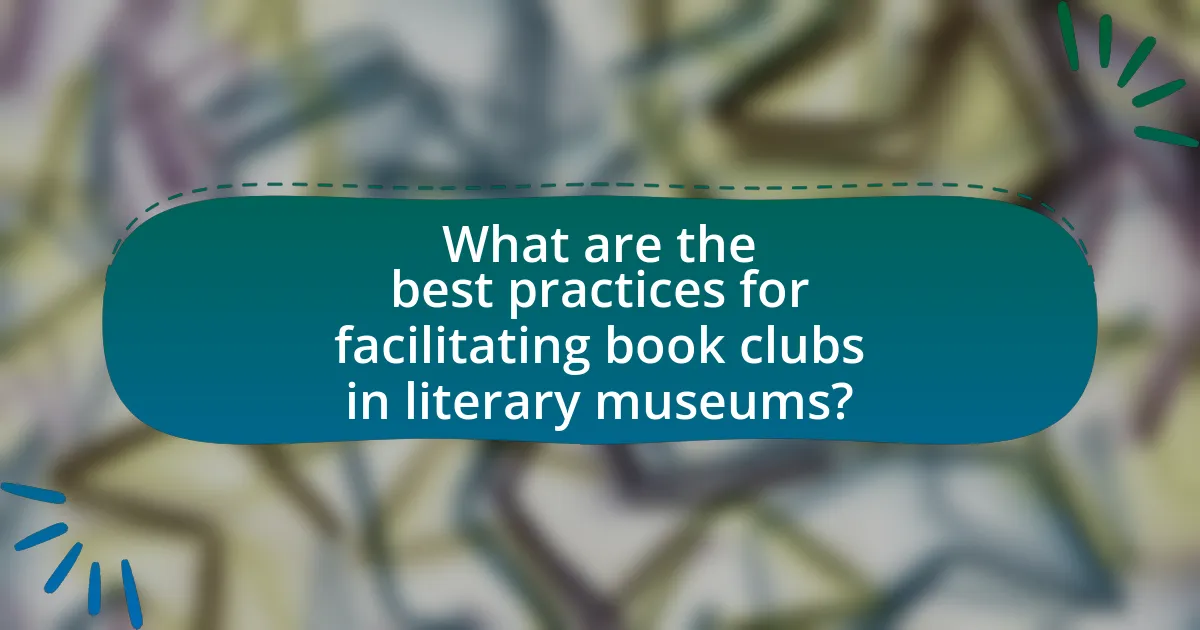
What are the best practices for facilitating book clubs in literary museums?
The best practices for facilitating book clubs in literary museums include creating a welcoming environment, selecting diverse and relevant literature, and incorporating interactive discussions. A welcoming environment encourages participation and fosters a sense of community among members, which is essential for engagement. Selecting diverse literature that reflects various genres, cultures, and perspectives enhances the educational value and broadens participants’ understanding of literary themes. Interactive discussions, facilitated by knowledgeable moderators, promote critical thinking and allow participants to share personal insights, making the experience more enriching. Research indicates that book clubs in educational settings can improve comprehension and foster a love for reading, as evidenced by studies showing increased literacy rates among participants.
How can facilitators create an inclusive environment for all participants?
Facilitators can create an inclusive environment for all participants by actively promoting diverse perspectives and ensuring equitable participation. This can be achieved through strategies such as establishing ground rules that encourage respect and openness, using varied formats for discussion that cater to different communication styles, and providing materials that reflect a range of voices and experiences. Research indicates that inclusive practices enhance engagement and learning outcomes, as seen in studies showing that diverse groups generate more innovative ideas and solutions.
What techniques can be used to encourage participation from quieter members?
To encourage participation from quieter members in book clubs, facilitators can employ techniques such as direct questioning, small group discussions, and creating a safe environment. Direct questioning involves asking quieter members specific questions to invite their input, which can help them feel valued and included. Small group discussions allow quieter individuals to express their thoughts in a less intimidating setting, fostering comfort and engagement. Creating a safe environment, where all opinions are respected and encouraged, can significantly reduce anxiety and promote participation. Research indicates that inclusive practices in group settings enhance overall engagement and satisfaction, making these techniques effective for encouraging quieter members to contribute.
How can facilitators manage diverse opinions during discussions?
Facilitators can manage diverse opinions during discussions by establishing clear ground rules that promote respect and active listening. These rules encourage participants to express their views while ensuring that all voices are heard, which is essential in a setting like a book club where varied interpretations of literature can arise. Research indicates that structured dialogue techniques, such as the use of a talking piece, can help maintain order and give everyone an equal opportunity to contribute, thereby reducing the likelihood of conflict and fostering a collaborative environment.
What resources are available for book club facilitators in literary museums?
Literary museums provide various resources for book club facilitators, including curated reading lists, discussion guides, and access to author events. These resources are designed to enhance the book club experience by offering thematic insights and contextual background related to the literature being discussed. For example, many literary museums offer educational programs that include workshops and seminars specifically tailored for facilitators, helping them to lead discussions more effectively. Additionally, facilitators can often access archival materials and exhibits that provide deeper understanding of the authors and works featured in their book clubs, enriching the overall engagement for participants.
How can facilitators utilize museum exhibits to enhance discussions?
Facilitators can utilize museum exhibits to enhance discussions by integrating the themes and narratives presented in the exhibits into conversation prompts. This approach encourages participants to draw connections between the exhibit content and their own experiences or perspectives. For instance, literary museums often showcase artifacts related to authors and their works, allowing facilitators to ask questions that provoke critical thinking, such as how the historical context of a literary piece influences its themes. Research indicates that interactive engagement with exhibits can lead to deeper understanding and retention of information, as seen in studies conducted by the American Alliance of Museums, which highlight the effectiveness of experiential learning in educational settings. By leveraging the rich context provided by museum exhibits, facilitators can create a dynamic environment that fosters meaningful dialogue and exploration of literary themes.
What tools can be used to track reading progress and engagement?
Tools that can be used to track reading progress and engagement include digital platforms like Goodreads, which allows users to log books read, set reading goals, and participate in discussions. Additionally, apps such as Bookly and Reading List provide features for tracking reading time, pages read, and overall engagement metrics. Research indicates that using these tools can enhance motivation and accountability among readers, leading to increased reading frequency and comprehension. For instance, a study published in the Journal of Educational Psychology found that students who used reading tracking tools showed a significant improvement in their reading habits and engagement levels.
What tips can enhance the overall experience of book clubs in literary museums?
To enhance the overall experience of book clubs in literary museums, organizers should incorporate themed discussions that connect the book’s content to the museum’s exhibits. This approach fosters deeper engagement by allowing participants to explore the historical and cultural context of the literature. For instance, if a book discusses a specific historical period, relevant artifacts or artworks in the museum can be highlighted during discussions, enriching the conversation and providing tangible connections to the text. Additionally, scheduling guided tours of the museum before or after book club meetings can further enhance understanding and appreciation of the literature, as participants can visualize and contextualize the themes within the museum’s collections.
How can themed events or guest speakers enrich book club sessions?
Themed events and guest speakers can significantly enrich book club sessions by providing unique perspectives and enhancing engagement with the material. Themed events create an immersive experience that aligns with the book’s content, allowing participants to explore themes in a tangible way, such as through food, decor, or activities related to the book. Guest speakers, particularly authors or experts in relevant fields, offer insights that deepen understanding and provoke thoughtful discussion, fostering a richer dialogue among members. Research indicates that interactive elements in group settings, such as those introduced by themed events and expert contributions, can increase retention and enjoyment of the material, making the book club experience more impactful.
What are effective ways to promote book clubs to attract new members?
Effective ways to promote book clubs to attract new members include utilizing social media platforms, hosting community events, and collaborating with local libraries or bookstores. Social media platforms like Facebook and Instagram can reach a wider audience, allowing clubs to share engaging content, such as book recommendations and meeting highlights, which can spark interest. Hosting community events, such as open discussions or author readings, can create a welcoming atmosphere that encourages participation. Collaborating with local libraries or bookstores can provide access to resources and promote the club through their networks, increasing visibility. According to a study by the American Library Association, community engagement initiatives significantly boost participation in local programs, demonstrating the effectiveness of these promotional strategies.
